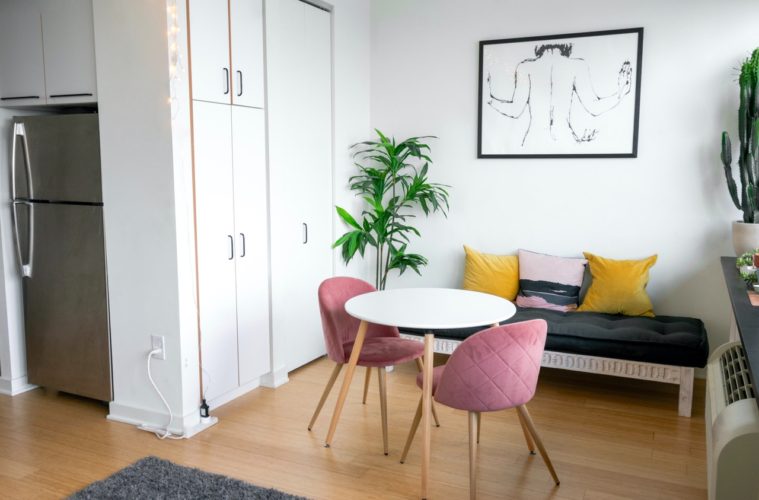When it comes to the more substantial purchases required for university, you’ll be in need of some fairly bulky items which will come with a hefty price tag, especially if buying them new. From high tech gadgets such as PCs, laptops, tablets and mobile phones to kitchen white goods, furniture and more. When buying new it’s handy to shop around and compare prices as you might save a plenty of money. But this can take a lot of time. Secondhand purchasing takes longer. It requires planning and possibly arranging to collect items, have them posted or have a courier do it for you. So is it worth forking out and buying new, or looking around and buying secondhand furniture?
We’ve prepared this mini guide to help answer just that. Plus, we provide you with a plan to purchase items in the easiest and most affordable way, whilst offering tips if you’re selling stuff!
I’d like to start off by saying that many reputable furniture stores often run flash sales. In fact it always feels like there’s a sale on at furniture stores. Key dates to consider are Bank Holiday weekends (especially Easter and Boxing Day sales), Black Friday, Cyber Monday and even seasonal sales such as spring/summer (as being advertised right now on many online retailer sites).
With specific furniture, especially for instance wooden storage units or dining tables, my opinion is that the lower budget items are still pricey, yet the quality is questionable. So the question I’d ask myself when wondering if to buy new or secondhand furniture is: how long does it need to last? If it’s for a year at halls, the cheap option is fine. If you however want to style and furnish you pad with items you want to keep for years, it’s better to buy higher quality.
When buying furniture check what the material is made of. Is it solid oak, or “oak effect”? Is it well constructed and think material or flimsy and thin?
As with with most items when you buy new, their resell value reduces quite a lot the minute you own it. You only need to check Facebook Market Place or Gumtree to find that out. Often you’ll find items which were originally very expensive (that have lost their resell value), are of higher quality, but still cheaper secondhand than the lower end budget brand new goods. So in effect, you’re getting a lot for your money if you buy high quality furniture secondhand. One problem is if you’re very picky with style or material you might have to sift through a lot of adverts.
When buying secondhand you’ve also got the annoying issue of collection, and, if it’s bulky you’re going to need a mate to help, or pay a man with a van, bumping up the price again. But another tip if you’re considering this route is to shop for a delivery guy on sites such as Gumtree as there’s usually a few to choose from – definitely don’t accept the first quote, call a few up and check their prices.
Another huge plus for buying secondhand is the fact you haven’t got to build it! Usually with furniture it requires assembly, and with product instructions often difficult and time consuming to follow. You also need extra spare time (and tools you might not have), when you could be studying or seeing friends.
When purchasing secondhand always ask the reason for the sale and give the item a good check before handing over cash as you won’t be able to return it if it’s faulty!
On the flip side if you’re buying new you can usually spread the payments across 3, 6, 12 months etc.
Assuming items are well kept, I have no problem buying some types of secondhand furniture such as a wardrobe, table desk, etc. I’d personally avoid secondhand items such as a mattress or a computer chair. I want to be the first person to fart on it.
So, let’s break this down into the pros and cons of buying goods new versus secondhand…
Pros of buying new:
- Large selection of choice
- Often free delivery
- Return option (see merchant for details)
- Guarantee
- Payment terms
Cons of buying new:
- Expensive
- Resell value likely to fall
- Assembly might be required
- Collection might be required
Pros of buying secondhand:
- Cheaper Often comes assembled
- Sustainable and environmentally friendly
- Will hold its value more
Cons of buying secondhand:
- Time consuming to search
- No guarantee or return policy
- Less choice
- Faulty goods
Summary
Buying secondhand can be enjoyable, helps someone out and is nicer to our planet. You can even end up getting the item for free since it’s original secondhand price might hold it’s value if you sell it on. But it can also be a pain to arrange with some people wasting time.
Buying new doesn’t always mean spending lots of money as you can find great discounted prices if you shop around. There’s a nice feeling you get walking out with a brand new set of Beats. A feeling you just won’t get if you’re buying a used pair.
Shop to suit your budget and needs and if you consider the options above for whatever you need to buy, we’re sure you’ll go with what works best for you based upon your needs. Happy shopping!




